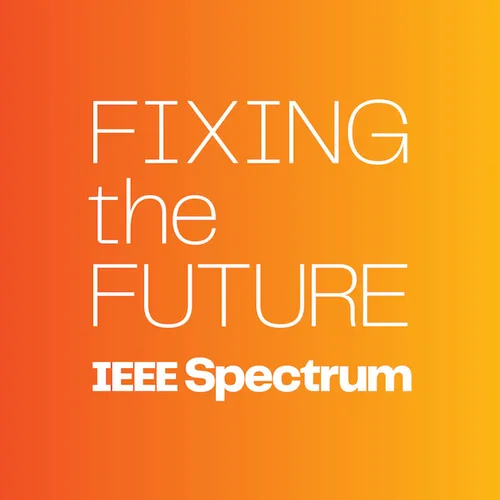
Fixing the Future
Fixing the Future from IEEE Spectrum magazine is a biweekly look at the cultural, business, and environmental consequences of technological solutions to hard problems like sustainability, climate change, and the ethics and scientific challenges posed by AI. IEEE Spectrum is the flagship magazine of IEEE, the world’s largest professional organization devoted to engineering and the applied sciences.
- Update frequency
- every 13 days
- Average duration
- 25 minutes
- Episodes
- 65
- Years Active
- 2020 - 2024

Why Cyberwar is Overhyped
Scott Shapiro is the author of Fancy Bear Goes Phishing: The Dark History of the Information Age in Five Extraordinary Hacks. You can read an excerpt of Fancy Bear at IEEE Spectrum, but in today's ep…

Explainer: Why No-Code Software Isn't Just For Developers
As large language models like GPT4 and Bard continue to take the world by storm, one of their most high-profile applications is their most unexpected: writing code. AI programming systems like Github…

How Our Body's Electrome Defines Us
Sally Adee's new book, We Are Electric: The New Science of Our Body’s Electrome, exams the centuries-long quest to understand how the body uses electricity. Beyond just how neurons send electrical si…

The Race To Link Chips With Light For Faster AI
Samuel K. Moore, IEEE Spectrum's senior editor and semiconductor beat reporter, talks about the competing technologies that hope to dramatically speed up computing, especially for machine learning.

Functional Programming: The Biggest Change Since We Killed The Goto?
Charles Scalfini, the CTO of Panoramic Software, makes the case for why programmers should make the leap to functional programming, which promises more maintainable code, and eliminates some of the p…

Truepic's Glass-to-Glass Fight Against Digital Fakes
Nick Brown, vice-president of product at Truepic, describes how the company's technology and standards developed by the Coalition for Content Provenance and Authenticity is fighting fakes and other f…

Rerouting Intention And Sensation In Paralyzed Patients
Patients who have traumatic nerve injuries can face significant paralysis, including paraplegia and quadriplegia. Chad Bouton's research is on developing devices that can decode and recode the electr…

Better Carbon Sequestration With AI
One potential path to tackling climate change due to rising carbon dioxide levels is to lock the carbon dioxide away in geological reservoirs deep underground. Deep learning AI technologies can produ…

The Bionic-Hand Arms Race
Britt S. Young talks with IEEE Spectrum senior editor Stephen Cass about her investigation into high-tech prosthetic hand design: "We are caught in a bionic-hand arms race. But are we making real pro…

The Why, How, and Maybe Not of Geoengineering
Silver Lining's executive direction Kelly Wanser explains why rising temperatures are behind the push to geoengineer the world's climate, the most plausible technologies, and why we need a lot more r…

Stopping Infection Outbreaks with AI and Big Data
Hospitals are where we go to get cured of infections and diseases, but sadly, sometimes tragically, and ironically, they are also places we go to get them. According to the Centers for Disease Contro…

A Small Startup Fights Rare Diseases With Big Data
Rare diseases are, well, rare. In two not unrelated ways. By definition, they’re diseases that afflict fewer than 200,000 people. But because, in the world of big business, in particular big pharma, …

Solving the Electric Vehicle Charging Conundrum
Like a lot of people, you may be thinking about trading in your car. Me too. The case, morally and even financially, for an all-electric car is becoming stronger and stronger.
And yet, what about rec…

IBM’s Fall From World Dominance
IBM is a remarkable company, known for many things—the tabulating machines that calculated the 1890 U.S. Census, the mainframe computer, legitimizing the person computer, and developing the software …

It’s Easy for Computers to Detect Sarcasm, Right?
There’s no question that computers don’t understand sarcasm—or didn’t, until some researchers at the University of Central Florida starting them on a path to learning it.
Software engineers have been …

Fixing the Chemical Industry’s Sustainability Problem
The most honest and inadvertently funny marketing message I ever saw was at a gas station that was closed for remodeling; it had been an Amaco station before that company was bought by BP. The sign s…

Let’s Put Cheap, Portable Nuclear Reactors onto Barges
Today’s startup invites us to rethink nuclear energy. Their plan? To put cheap, portable nuclear reactors onto barges and float them out to sea. What could go wrong? According to today’s guest, basic…

Until We Get Rid of Fossil Fuels, Can Data Make Them More Efficient?
A few months ago, we had on the show an economist who specialized in the energy sector. She noted that while the Trump administration had put drilling rights the Alaska Natural Wildlife Refuge, or AN…

Can a Robot Be Arrested? Hold a Patent? Pay Income Taxes?
When horses were replaced by engines, for work and transportation, we didn’t need to rethink our legal frameworks. So when a fixed-in-place factory machine is replaced by a free-standing AI robot, or…

The Future of Post-Industrial Cities
As we begin to finally address climate change in a serious way, we need to look at our cities in a serious way. And not just first-tier cities like, well, New York, San Francisco, Seattle, and Los An…